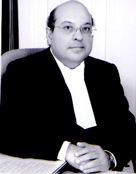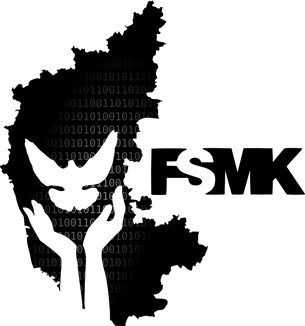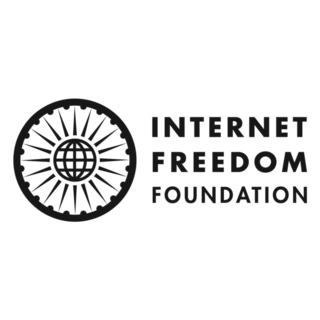Section 377 of the British colonial penal code criminalized all sexual acts "against the order of nature". The law was used to prosecute people engaging in oral and anal sex along with homosexual activity. As per Supreme Court Judgement since 2018 Indian Penal Code Section 377 is used for Convictions of non consensual sexual activities among homosexuals with a minimum of ten years imprisonment extended to life imprisonment. It has been used to criminalize third gender people, such as the apwint in Myanmar. In 2018, British Prime Minister Theresa May acknowledged how the legacies of British colonial anti-sodomy laws continue to persist today in the form of discrimination, violence, and death.
Vithal Mahadeo Tarkunde, was a prominent Indian lawyer, civil rights activist, and humanist leader and has been referred to as the "Father of the Civil Liberties movement" in India and a former judge of the Bombay High Court The Supreme Court of India also praised him as "undoubtedly the most distinguished judge of the post-Chagla 1957 period" in the Bombay High Court.

Nikkhil Suresh Advani is an Indian director, producer and screenwriter who works in Hindi cinema. He along with his sister, Monisha Advani and Madhu Bhojwani, co-founded the entertainment company Emmay Entertainment.

Internet censorship in India is done by both central and state governments. DNS filtering and educating service users in suggested usages is an active strategy and government policy to regulate and block access to Internet content on a large scale. Measures for removing content at the request of content creators through court orders have also become more common in recent years. Initiating a mass surveillance government project like Golden Shield Project is an alternative that has been discussed over the years by government bodies.

The Information Technology Act, 2000 is an Act of the Indian Parliament notified on 17 October 2000. It is the primary law in India dealing with cybercrime and electronic commerce.

Dhananjaya Yeshwant Chandrachud is an Indian jurist, who is the 50th and current chief justice of India serving since November 2022. He was appointed a judge of the Supreme Court of India in May 2016. He has also previously served as the chief justice of the Allahabad High Court from 2013 to 2016 and as a judge of the Bombay High Court from 2000 to 2013. He is also a former executive chairperson (ex officio) of the National Legal Services Authority.
Information technology law(IT law) or information, communication and technology law (ICT law), concerns the juridical regulation of information technology, it's possibilities and the consequences of it's use, including computing, software coding, artificial intelligence, "the internet" and virtual worlds. The ICT field of law comprises elements of various branches of law, originating under various acts or statutes of parliaments, the common and continental law and international law. Some important areas it covers are information and data; communication; information technology, both software and hardware and technical communications technology, including coding and protocols.

Gopal Subramanium is an Indian lawyer, international arbitrator, academic and Senior Advocate who practices primarily in the Supreme Court of India and the Delhi High Court. He served as the Solicitor General of India 2009–2011 and Additional Solicitor General of India 2005–2009. He served as Chairman of the Bar Council of India 2010–2011.

Rohinton Fali Nariman is a former judge of the Supreme Court of India. Before being elevated as a judge, he practised as a senior counsel at the Supreme Court. He was appointed the Solicitor General of India on 23 July 2011. He also served as a member of the Bar Council of India. He was designated as a Senior Counsel by Chief Justice Manepalli Narayana Rao Venkatachaliah in 1993 at the early age of 37.
Save Your Voice is a movement against internet censorship in India. It was founded by cartoonist Aseem Trivedi, journalist Alok Dixit, socialist Arpit Gupta and Chirag Joshi in January 2012. The movement was initially named "Raise Your Voice", before it was renamed. The movement started from Ujjain in Madhya Pradesh, under the frontier-ship of the movement's four founders; with a "Langda March" at Ujjain. The movement opposes the Information Technology Act of India and demands democratic rules for the governance of Internet. The campaign is targeted at the rules framed under the Information Technology Act, 2000.

Ashoka University is a private research university located in Sonipat, India, providing a liberal education in the humanities, social sciences, and natural sciences.

Free Software Movement Karnataka (FSMK) is a non-profit organization working for spreading free software and its ideals. The movement is inspired by software freedom visionaries like Richard Stallman and Eben Moglen. FSMK is one of the member organizations of Free Software Movement of India.

The Central Monitoring System, abbreviated to CMS, is a centralized telephone interception provisioning system installed by the Centre for Development of Telematics (C-DOT), an Indian Government owned telecommunications technology development centre, and operated by Telecom Enforcement Resource and Monitoring (TERM) Cells. The CMC system is going to be set up in each major state collocated with the TERM Cells. Telecom operators in India are required by law to give access to their networks to law enforcement agencies.

Mass surveillance is the pervasive surveillance of an entire or a substantial fraction of a population. Mass surveillance in India includes Surveillance, Telephone tapping, Open-source intelligence, Lawful interception, and surveillance under Indian Telegraph Act, 1885.

Anshu Gupta is an Indian entrepreneur. He founded the non-governmental organization Goonj. Goonj works on bridging urban and rural inequality. It does this by channelizing the urban surplus to initiate rural upliftment, disaster relief, and rehabilitation. Through Goonj, Anshu is building a parallel trash-based economy by creating barter between rural communities and urban surplus material. Anshu has been recognized by the Ramon Magsaysay foundation for his "creative vision in transforming the culture of giving in India".

Shreya Singhal v. Union of India is a judgement by a two-judge bench of the Supreme Court of India in 2015, on the issue of online speech and intermediary liability in India. The Supreme Court struck down Section 66A of the Information Technology Act, 2000, relating to restrictions on online speech, as unconstitutional on grounds of violating the freedom of speech guaranteed under Article 19(1)(a) of the Constitution of India. The Court further held that the Section was not saved by virtue of being a 'reasonable restriction' on the freedom of speech under Article 19(2). The Supreme Court also read down Section 79 and Rules under the Section. It held that online intermediaries would only be obligated to take down content on receiving an order from a court or government authority. The case is considered a watershed moment for online free speech in India.

Mishi Choudhary is a technology lawyer and online civil liberties activist working in the United States and India. She is the senior vice president and general counsel of Virtru, a role she started in 2022. Prior to that role, Mishi was the Legal Director of the Software Freedom Law Center as well as the Founder of SFLC.in. SFLC.in brings together lawyers, policy analysts and technologists to fight for digital rights, produces reports, and studies on the state of the Indian internet, also has a productive legal arm. Under her leadership, SFLC.in has conducted landmark litigation cases, petitioned the government of India on freedom of expression and internet issues, and campaigned for WhatsApp and Facebook to fix a feature of their platform that has been used to harass women in India.

Internet Freedom Foundation (IFF) is an Indian digital rights organisation that advances liberty, equality, fraternity and social justice in the digital age. IFF has three verticals of work that include strategic litigation, policy engagement and civic literacy.

The Information Technology Rules, 2021 is secondary or subordinate legislation that suppresses India's Intermediary Guidelines Rules 2011. The 2021 rules have stemmed from section 87 of the Information Technology Act, 2000 and are a combination of the draft Intermediaries Rules, 2018 and the OTT Regulation and Code of Ethics for Digital Media.
Shalu Nigam is an Indian lawyer, feminist legal scholar, and author. She was the petitioner in the landmark case Shalu Nigam v. Regional Passport Officer, decided on 17 May 2016, which held that passports can be issued without requiring the name of the father.














